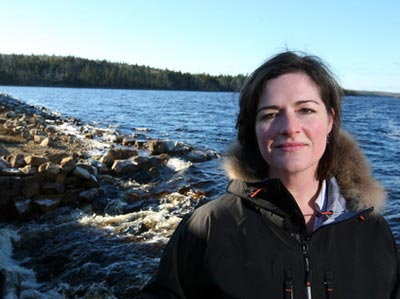 |
| Shannon Sterling, professor in Environmental Science, leads the Nova Scotia Watershed Assessment Project. (Nick Pearce Photo) |
Water is fundamental to the life, economy and ecosystem of Nova Scotia. Properly managing and understanding that resource and those that depend on it is essential to adequately use and protect it.
On Thursday, Environment and Fisheries and Aquaculture Minister, Sterling Belliveau introduced the province’s new Water Resource Management Strategy to do just that. The first project announced under the new strategy, the Nova Scotia Watershed Assessment Project (NSWAP), is a three-phase project that will bring together information currently available on Nova Scotia’s major watersheds and create the first comprehensive assessment of the health of watersheds in the province. The $19,000 first phase of the project, funded by the Department of Environment, will be led by Shannon Sterling's Hydrologic Systems Research Group at Dalhousie.
“Up to now, there hasn’t been a comprehensive policy framework on water resources in Nova Scotia,” says Dr. Sterling, professor in Environmental Science. “As a result, many studies haven’t been government-driven and have been done at a grassroots level, with a high proportion of community watershed groups performing the water testing and monitoring.”
Synthesis of data
These community groups, like the Sackville Rivers Association, have gathered useful information but there hasn’t been a synthesis of this data at the provincial level. A large aspect of NSWAP is information gathering (also from various government agencies and universities) and merging it all into one geographic information system (GIS).
This information, including stream networks, dam inventory and land cover data will be collected from the communities and be entered into a geo-database. This synthesis of watershed information that will be made available to the public online so the community groups can access which will help improve water management across the province.
“Another important step of the NSWAP is the development of watershed report cards of to evaluate impacts from things like dams and land cover,” explains Dr. Sterling. “We can then look at what that means to drinking water, which watersheds are most at risk and what the most prevalent problems most likely are. We’ll also be able to identify key information gaps.”
The study will help further our understanding of other risks to our watersheds in Nova Scotia, such as pollution and acid rain, which is still a problem in Nova Scotia. Other crucial information that will be addressed is impacts to instream habitat and riparian forest removal (the interface between land and a river or stream).
“We need to have accurate water budgets,” says Dr. Sterling. “This is the first phase in finding out how much water we have and how much we use. We currently don’t have that information.
“The NSWAP will help us plan for the future because we will know which areas are more vulnerable to things like climate change and land use change. By comparing the impact risks with our watershed priorities and values, such as drinking water and salmon habitat, we’ll be able to know where to focus resources based on science.”
Report cards
Individual watershed report cards eventually will be available to the public to show where problems exist and what is needed to be done.
“If you have an unstable water supply you can’t predict if you can run a factory or supply a community,” Dr. Sterling explains. “This way, we’ll give the communities the opportunity to inform themselves and be part of the process and even help create their own innovative projects.”
Dr. Sterling’s team includes Peter Horne and Gillian Fielding,. The watershed health information will eventually be mobilized to the public and to other researchers and stakeholders to promote integrated watershed management in Nova Scotia, not only at the community level, but at all levels of government so they can best use the information.
“One hope is that once we get this information, we can compare similar communities facing similar issues and promote communication and working together on addressing them."
